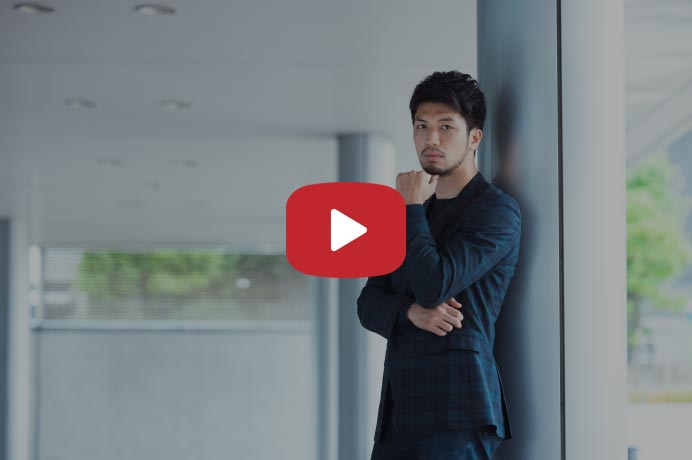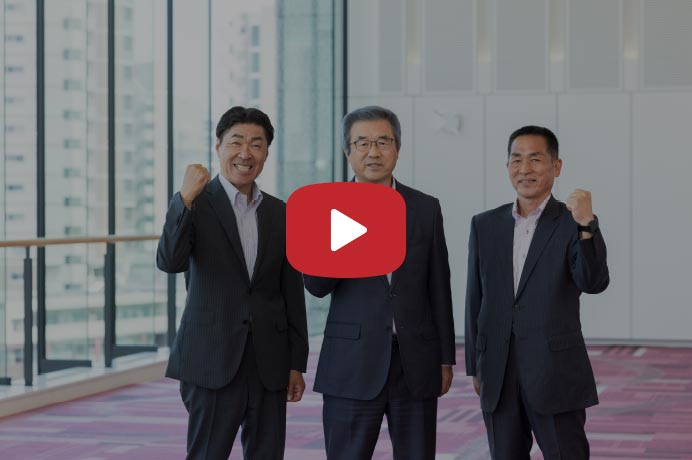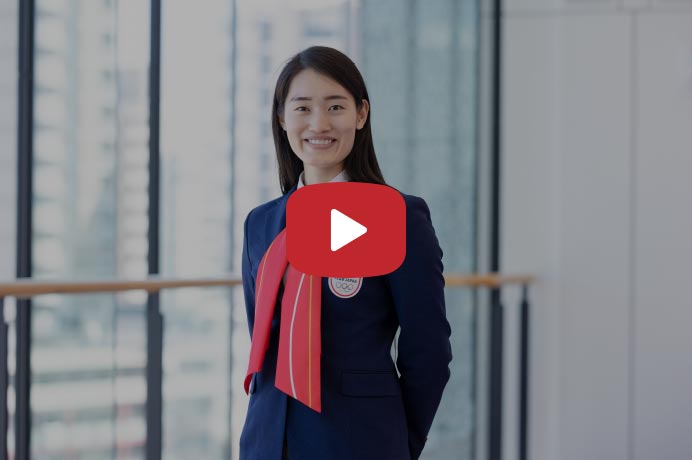- Alumni HOME
- My Philosophy Yoshio Suzuki×Etsuko Yaguchi
Founded in 1969, Saza Coffee is an independently run business that operates 16 coffee shops in Greater Tokyo, as well as its own coffee plantations in Colombia. How has the company succeeded in expanding its business in a market full of major coffee chains? What is the life philosophy of Mr. Yoshio Suzuki, Saza Coffee founder and a Toyo University alumnus? Toyo University President Etsuko Yaguchi talked with Mr. Suzuki at Saza Coffee’s head shop.
Yoshio Suzuki
Representative Director and Chairman, Saza Coffee Holdings Ltd.
Graduated from the Department of Law, Faculty of Law, in 1964.
After working as a movie
producer, Mr. Suzuki opened the first Saza coffee shop in 1969. In 1996, the company
purchased its own coffee plantations in Colombia. The company’s network of coffee shops has
been expanding in Greater Tokyo, centered on Ibaraki Prefecture. As a researcher in coffee
culture, Mr. Suzuki directly engages in new product development.
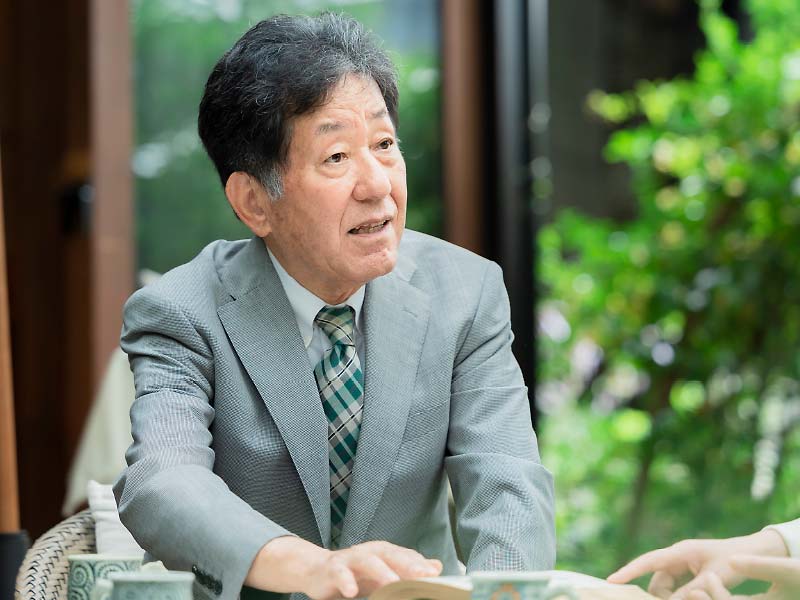
Etsuko Yaguchi
President, Toyo University
A Professor in the Faculty of Letters, President Yaguchi holds a doctorate in Humanities. She left the doctoral program at Ochanomizu University Graduate School of Humanities and Sciences upon fulfilling all coursework requirements in March 1986. She was appointed Professor at Toyo University in April 2003. She became Toyo University’s 44th President in April 2020. Her main research interests are social education and lifelong learning.
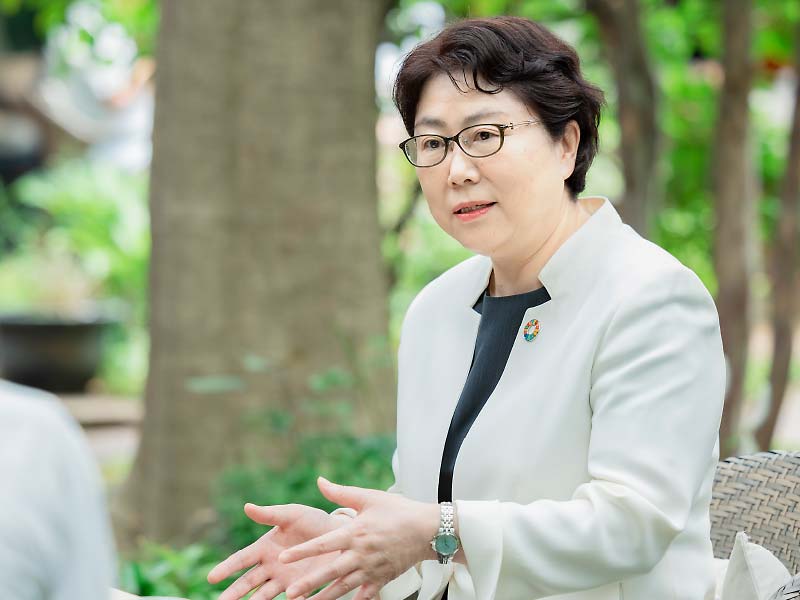
Enryo Inoue’s sentiments when visiting coffee plantations
—President Yaguchi, your area of specialization is social education. Has your research ever been related to coffee?
- Yaguchi:
- Researching in my domain once led me to look into the history of coffee houses. I took particular interest in how coffee houses developed in Europe, which are said to have served as a basis for the Puritan Revolution in the 17th century.
- Suzuki:
- Coffee houses in London were the starting points of institutions that have become essential in modern society, such as newspapers, publishing houses, and financial organizations. In 17th-century Europe, coffee houses developed especially in London.
- Yaguchi:
- In those days, many people went to coffee houses to read newspapers and magazines and exchange ideas with others.
- Suzuki:
- That’s how modern journalism came into being. Lloyd’s, a major insurance company, also started from a London coffee house.
- Yaguchi:
- The teacher who mentored me had enthusiastically researched not only the history of coffee houses but also coffee per se until he passed away. The memento I received from this teacher is a copy of All about Coffee (written by William H. Ukers). I’m sure you’re familiar with this book, Mr. Suzuki.
- Suzuki:
- Of course. That book is a bible for coffee specialists like me. It covers everything related to coffee. I obtained my copies about 20 years ago, a 1935 revised edition and a Japanese version.
- Yaguchi:
- I received from my teacher a first-edition copy published in 1922. It is even autographed by the author. It’s my treasure.
- Suzuki:
- I don’t think there are many people in Japan who have first-edition copies. The book carries detailed information on things like how much coffee is produced in different countries in the world and how coffee is traded. So I used to study with this book.
- Yaguchi:
- This book is also useful in tracing and appreciating the overseas travels of Enryo Inoue, the founder of Toyo University. During the Meiji period, Enryo traveled all over the world, including to Yemen and Brazil, which are major coffee producers.
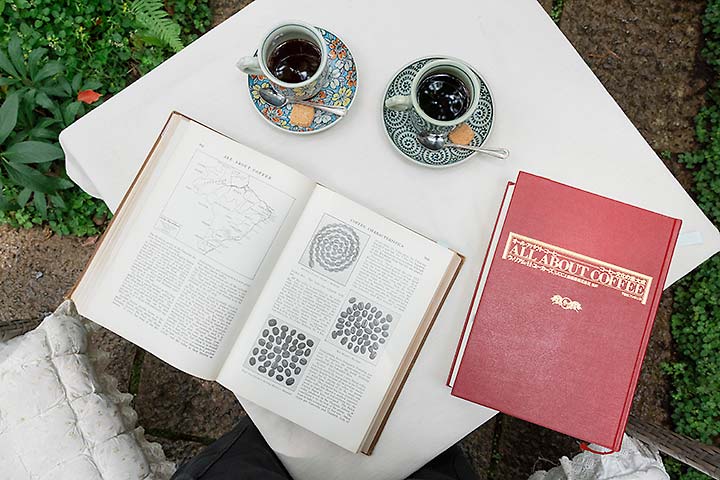
- Suzuki:
- Enryo indeed made a grand tour. His three overseas inspection trips included not just one but two visits to Yemen, which is like the holy land of coffee. In Brazil, he visited coffee plantations in São Paulo.
- Yaguchi:
- All about Coffee mentions the situations of coffee producing regions in those days, including Yemen and São Paulo.
- Suzuki:
- The book also mentions coffee consumption around the world. At the time the book was written, the United States had just become the world’s primary coffee consumer. As a coffee production center, São Paulo was booming but was troubled by a shortage of workers. That’s why many Japanese emigrated to São Paulo to work on coffee plantations. But in those days, an anti-Japanese movement was gathering momentum, instigated mainly by the United States. I think Enryo was concerned about Japanese immigrants in São Paulo.
- Yaguchi:
- His purpose was not to learn about coffee but to find out how the Japanese plantation workers were doing in such a harsh situation.
- Suzuki:
- In his travel journal, Enryo kept detailed records of Japanese workers’ daily lives, including how much they were making. São Paulo in those days was not developed at all. Trying to carve out a living there must have been extremely difficult for the Japanese immigrants.
- Yaguchi:
- Indeed. It’s not hard at all to imagine what Enryo’s sentiments must have been like as he headed to meet Japanese laborers enduring hardships so far away from their home country.
- Suzuki:
- It was in 1908 that Japanese emigrated overseas for the first time. There were about 800 of them, and it’s said that no more than 200 were still there a year later. Enryo went to Brazil three years later.
- Yaguchi:
- He must have brought consolation and encouragement to Japanese immigrants working under harsh conditions in a land where the language and daily customs were different.
- Suzuki:
- During his first overseas trip, Enryo visited some European countries. At that time, France was making a huge contribution to the modernization of coffee culture, mainly with the invention of the drip pot. It is quite intriguing that Enryo was there himself during the same period.
- Yaguchi:
- Although coffee was not the theme of his investigation, his visits were somehow related to coffee in many places in one way or another, and he made notes in his travel journal. I suppose those notes represent something highly valuable to you.
- Suzuki:
- Very much so. He kept very detailed records as if he were a newspaper reporter.
A journey of 40 years as the foundation of Saza Coffee
—In March 2022, Toyo University started selling an original coffee blend, Inoue Enryo Kohi Monogatari (Enryo Inoue’s Coffee Story), inspired by Enryo’s life.
- Yaguchi:
- It’s a product of collaboration between Saza Coffee and Toyo University, and it has enabled us to communicate Enryo Inoue’s life and work widely to the general public. I really appreciate the way Saza Coffee has condensed various episodes from his overseas trips into this coffee blend.
- Suzuki:
- Taking hints from Enryo’s travel journal, which you have mentioned, we blended beans from Japanese coffee plantations in São Paulo with Yemeni mocha matari.
- Yaguchi:
- It tastes really good. I love the flavor and also the package. I have already bought several sets to offer as gifts to alumni and visitors from abroad.
- Suzuki:
- Thank you very much. I hope that people will enjoy the coffee not only as a nice beverage but as a reminder of Enryo’s philosophy and the historical background it represents.
—Mr. Suzuki, we understand that you have also traveled quite frequently to visit coffee production sites all over the world.
- Suzuki:
- Yes. Since I initially worked as a film producer, I knew nothing about coffee at first. I only knew that I wanted to be able to offer delicious coffee. I said to myself that I couldn’t be a true coffee seller without knowing the coffee growing areas in the world. So I borrowed some money and took off. I continued my trips for 40 years.
- Yaguchi:
- So, essentially, you practiced Enryo’s teaching for that long period of time.
- Suzuki:
- Having visited coffee growing areas around the world for so many years, I came around to the idea of growing my own ideal coffee beans.
- Yaguchi:
- That decision resulted in the acquisition of your own coffee plantations in Colombia. You visited various plantations in person and arrived at that decision. I think it’s wonderful that you visited the actual sites yourself, making sure with your own eyes before taking action.
- Suzuki:
- The travel I have done over 40 years is my personal asset. Knowledge and experience have been important, but building ties founded on trust with local people has been the most important element in Saza’s coffee journey. It’s thanks to local people’s support and vigilance that we can run coffee plantations in Colombia, where there are still security issues.
- Yaguchi:
- Do your employees also go to Colombia?
- Suzuki:
- Baristas must go there to see the plantations in person because they have to describe and explain the various coffees to customers. Knowing the actual production sites is essential for those “artisans” of coffee.
- Yaguchi:
- This uncompromising attitude of yours explains why Saza Coffee has been so successful, increasing the number of coffee shops despite the presence of giant coffee chains.
- Suzuki:
- We spare no effort to sell quality coffees and have our customers truly appreciate their quality.
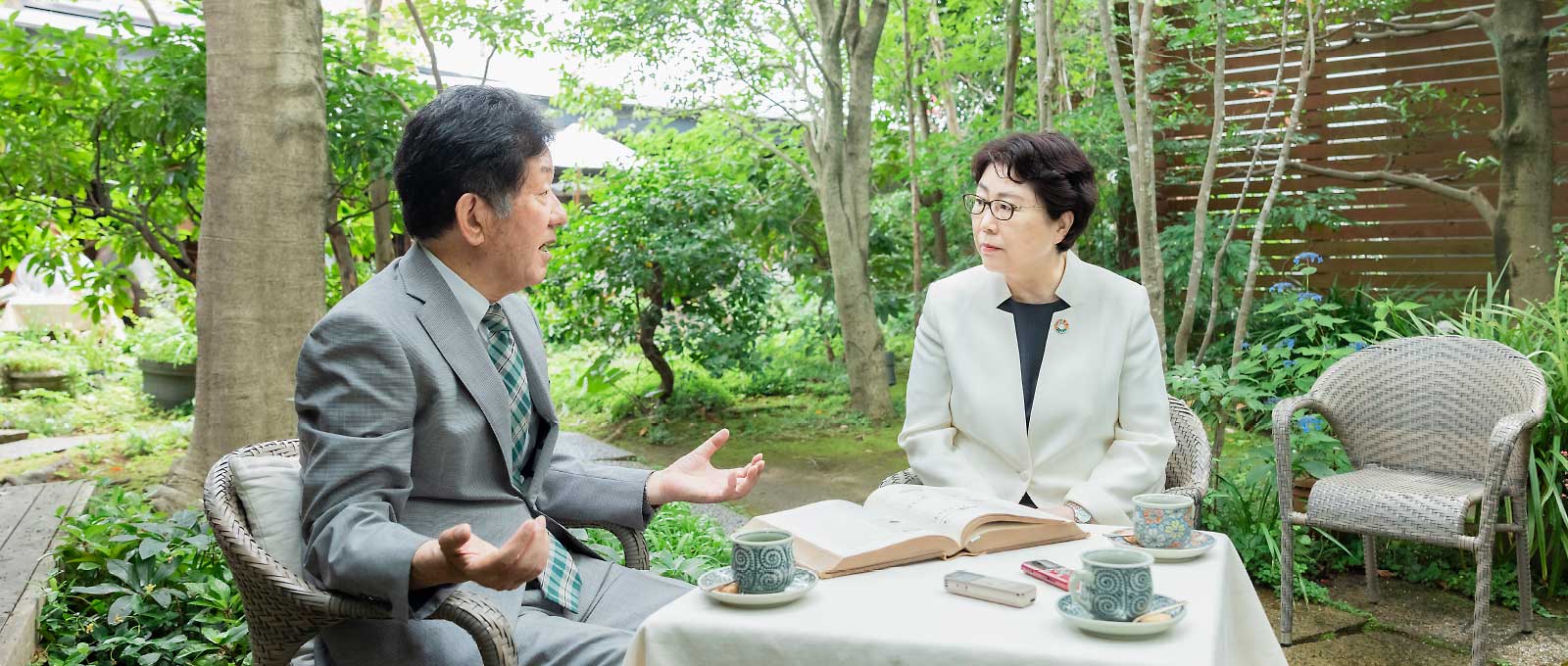
Coffee as a unifier of people and cultures
- Yaguchi:
- It’s you yourself, Mr. Suzuki, who came up with the ideas for Saza Coffee’s original blends, such as Shogun Coffee, named after Yoshinobu Tokugawa (the 15th and last Shogun), and Eiichi Shibusawa French Coffee Story.
- Suzuki:
- By blending historical and cultural elements into coffee, you can offer customers not only flavors to enjoy but also something to ponder on while drinking it. Of course, the original blends are also our means to differentiate ourselves from the other coffee chains, but I created them because I wanted to offer something enjoyable that has a special historical link with each locale.
- Yaguchi:
- You have found something in the local community’s culture and history, weaved a story out of it, and developed it into a product. You are certainly an entrepreneur working like a researcher. Speaking of local communities, Saza Coffee is particularly popular here in Ibaraki Prefecture, while your Tokyo shops are also doing well.
- Suzuki:
- I believe that Saza Coffee is what it is today thanks to local people’s support. To express our gratitude, each year we offer 3,000 cups of free coffee during the annual Katsuta Marathon in Hitachinaka City, Ibaraki Prefecture, which attracts over 20,000 runners across the country. Because of this, some local people even say, “You’re not Saza but Tada (free) Coffee.”
- Yaguchi:
- That’s certainly a statement of love! You must feel honored. It’s proof that you are loved by the local community here. You offer coffee where people meet, and you also interact with people while doing that and contribute to the local community. You’re doing the “act locally” part of a truly global mindset. You’re acting out a value that we really must cherish today.
Practicing Enryo Inoue’s teachings by personally taking action
—Toyo University has welcomed a number of Ukrainian students. Saza Coffee also responded very quickly by offering humanitarian support.
- Suzuki:
- A major historic crisis is taking place. We took action immediately by collecting donations, and we sent them to the Ambassador of Ukraine. I think in a situation like this we should act rather than just think.
- Yaguchi:
- I came up with the idea of setting up a mechanism that would guarantee that students in Ukraine could continue their studies. So I asked the Embassy of Ukraine for help in coordinating the initiative, which enabled me to directly talk with the presidents of a number of Ukrainian universities. At present, 12 Ukrainian students are continuing their studies at Toyo University.
- Suzuki:
- Gather on-site information and then take action—you are closely adhering to Enryo’s teachings.
- Yaguchi:
- It is my principle to check with the parties that are directly concerned, instead of relying on second-hand information. I think your approach is the same. If there are people in serious trouble, I try to provide assistance that should be really useful based on the facts. Once again, this resonates with Enryo’s way of thinking and acting.
- Suzuki:
- In everything, as in business, it’s important to translate ideas into action. This requires preparation and determination, but you can’t move forward just by thinking.
- Yaguchi:
- I feel proud that you are among our alumni, as you have always taken action while aiming for the essence of what you pursue, while exploring new territory. I am also glad that, as a coffee lover, I have had this precious conversation with you today. I suppose you will still continue exploring to find something new.
- Suzuki:
- It’s wonderful to continue learning, regardless of your age. I have applied Enryo’s teachings to my business enterprise. I have failed many times, but I have kept trying. Failures can appear painful to spectators around you, but it’s fine as long as you are happy. It’s up to you to decide what makes you feel happy. I hope that everyone will continue nurturing their curiosity and continue taking up many new challenges.
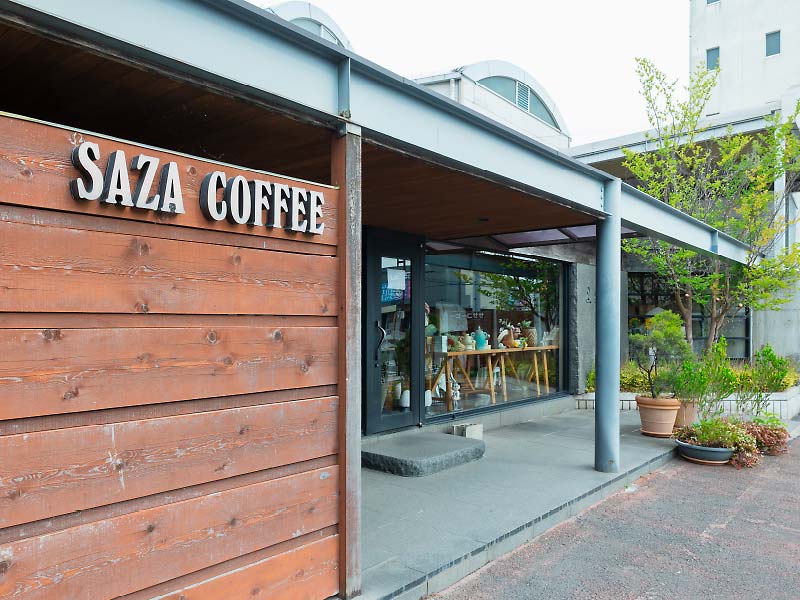
Saza Coffee Head Shop
8-18 Kyoei-cho, Hitachinaka City, Ibaraki PrefectureTEL:029-270-1151
Hours: 10:00~20:00
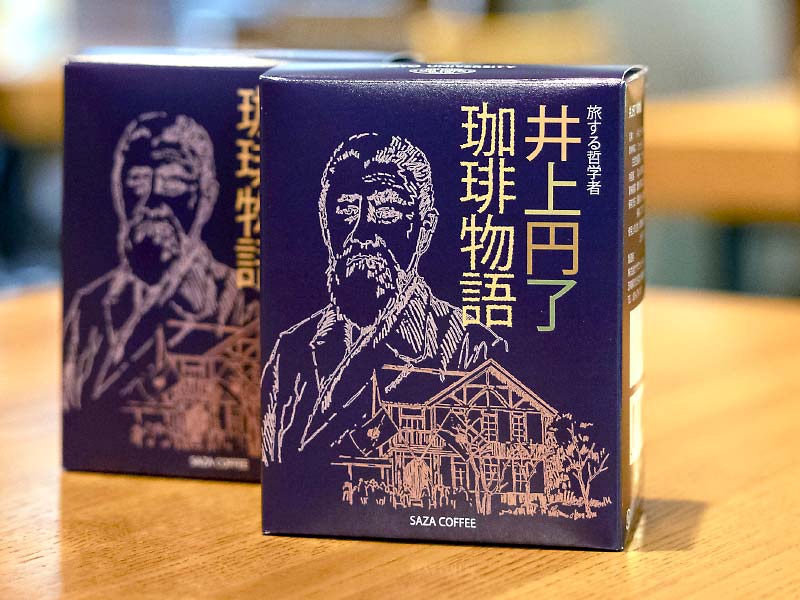
Toyo University × Saza Coffee collaboration Inoue Enryo Kohi Monogatari (Enryo Inoue’s Coffee Story)
Original coffee blend created by Saza Coffee, taking inspiration from trips taken by Toyo
University founder Enryo Inoue to major coffee production centers in the world, such as Brazil
and Yemen.
1 set of 5 packs 1,000 yen (tax included)
- CONTENTS -
- MOVIES -
-
Special Interview
Ryota Murata -
Special Trialogue
Mitsuo Tatsukawa
Masayuki Matsunuma
Akihiko Fujita -
Athletes to Watch
Asa Ando

